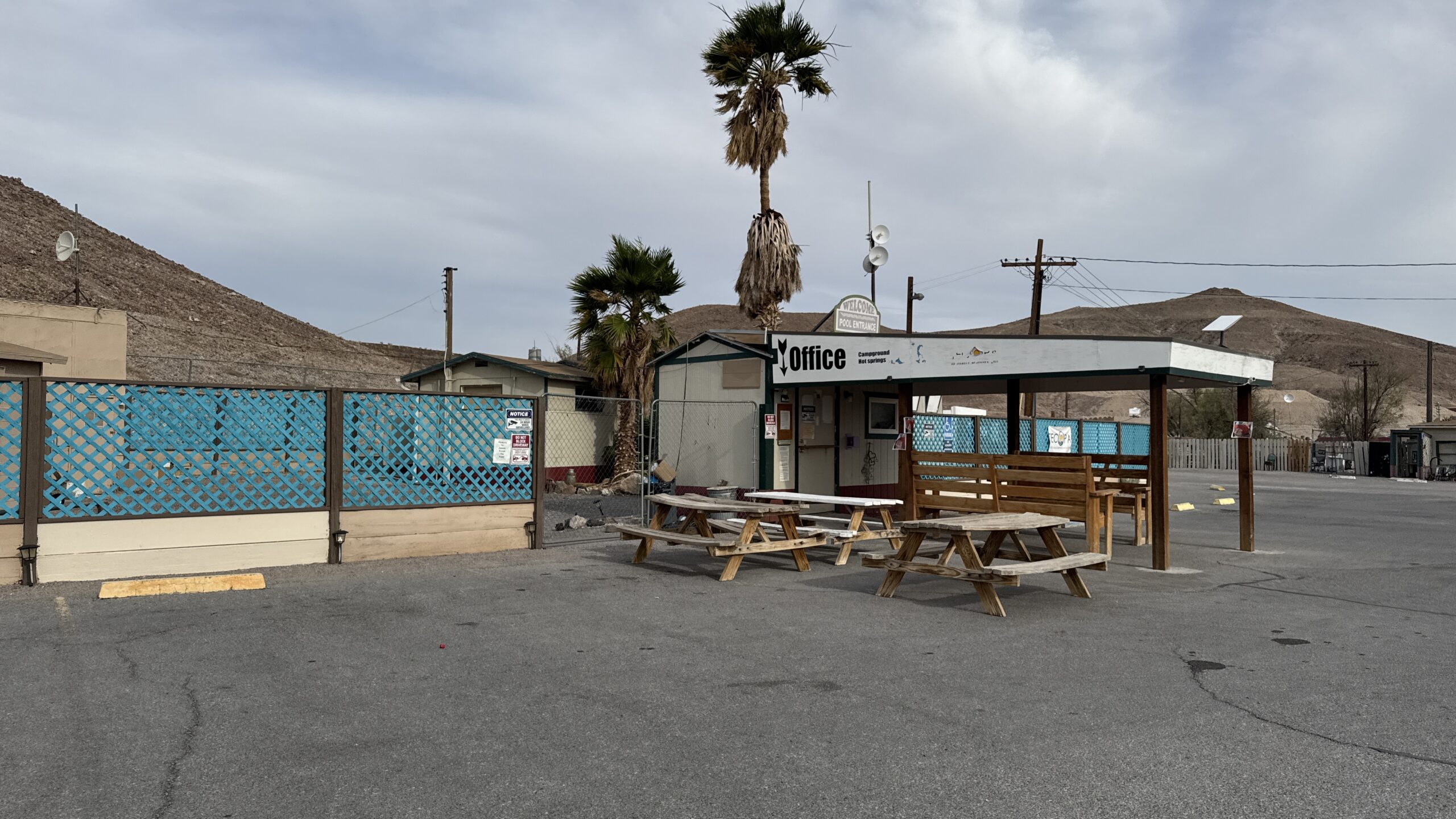In Southeast Inyo County, the Tecopa Hot Springs Campground and Pools — a longtime draw for tourists and a vital amenity for local residents — is once again changing hands. The private concessionaire that has operated the site for a decade has opted to vacate its lease after receiving a formal 30-day cure notice from Inyo County citing unpaid fees, incomplete improvements, and unauthorized construction. According to County sources, the operator has agreed to clear out and return the property “as close to how they found it,” leaving Inyo County officials to manage the site and search for a new operator under an open request for proposals released this week.
A letter dated May 27, 2025, from County Administrator Nathan Greenberg lays out the official record of what went wrong between Inyo County and Tecopa Hot Springs Conservancy LLC. And for the first time, the paper trail makes clear just how deep the fractures ran — from unpaid fees and missing financial records to unfulfilled upgrades and unpermitted construction that violated local codes and even the federal lease that underpins the entire site.
According to the letter, the County’s first point of contention was as basic as it was telling: unpaid rent. Under the concession agreement signed in 2021, the operator was required to pay an annual $5,000 operations fee — a modest sum waived in the first two years in exchange for completing priority improvements during the pandemic that the aging desert campground has needed for decades. Yet since then, only a single partial payment of $3,000 ever arrived. With the waiver expired, the County deemed the non-payment for 2023 and 2024 a breach of contract and grounds for termination.
The letter also points to a persistent lack of transparency. Section 5 of the lease required the Conservancy to keep detailed accounting records for camping fees, pool use, RV dump revenue, and store sales — and to submit annual financial statements each June. Despite repeated requests, the County says those records were either late, incomplete, or missing altogether. Even when profit and loss statements finally landed on the County’s desk in March, they left out entire revenue streams the lease requires to be documented.
But it was the site itself — and the gap between promises made and conditions found — that sealed the fate of the lease. In stark language, the County’s letter notes that while the operator did some work on the campground restrooms and plumbing, many alterations were done without permits or inspections, leaving facilities that do not comply with building codes or the Americans with Disabilities Act (ADA). Basic improvements promised since 2021 — picnic tables for every campsite, upgraded electrical panels near the bathhouse, accessible paved pathways — remain incomplete. In “Section D” of the campground, not a single required fire ring with cooking grates was ever installed.
Perhaps most striking, the letter reveals that the operator built six unapproved cabins — two permanent stick-built structures and four foam cabins — without a single permit, inspection, or written County consent. These unauthorized structures were rented to guests and used without any occupancy certificate, placing the County in violation of its own master lease with the Bureau of Land Management (BLM). These buildings have since been removed and the grounds returned to their prior condition.
Faced with the 30-day deadline to pay back fees, deliver missing financials, remove cabins, and complete long-delayed upgrades, Paul Barnes — the Conservancy’s owner and manager — chose a different path. According to sources, Barnes spoke with County representatives in early June after receiving their letter, and, by all accounts, the conversation was amicable. Barnes reportedly told the County that the company would clear out everything and restore the property as best they could. In a gesture of good faith, he also agreed to keep the Conservancy’s website online for now, updated with County contact information so that visitors with questions during the transition can reach the right office.
By County accounts, the handover was remarkably smooth given the circumstances. Deputy County Administrator Meaghan McCamman confirmed as much, telling TecopaCabana, “Paul was a good partner on his way out the door.”
Now, Inyo County officials seem hopeful and energized about what comes next. There is tremendous potential for a new operator with the right vision — and the County says it is committed to minimal disruption at the campground while the search for new leadership plays out. For trailer owners who continue to store vehicles on-site, the County has pledged to honor existing storage commitments to avoid leaving local residents and seasonal visitors in the lurch.
Still, the fundamental question remains: can a new concessionaire succeed where the last one failed? Inyo County’s newly released request for proposals once again calls for a vision of remodeled bathhouses, upgraded electrical hookups, campsite amenities and ADA pathways — the same upgrades the last lease could not deliver.
But unless the County confronts who truly bears responsibility for these baseline infrastructure investments — and how to realistically pay for them — any new operator could be set up to repeat history.
For now, the pools are quiet, the empty campsites rest under the desert sun, and the old bathhouses wait for someone willing, and able, to keep a decades-old promise.


Leave a Reply